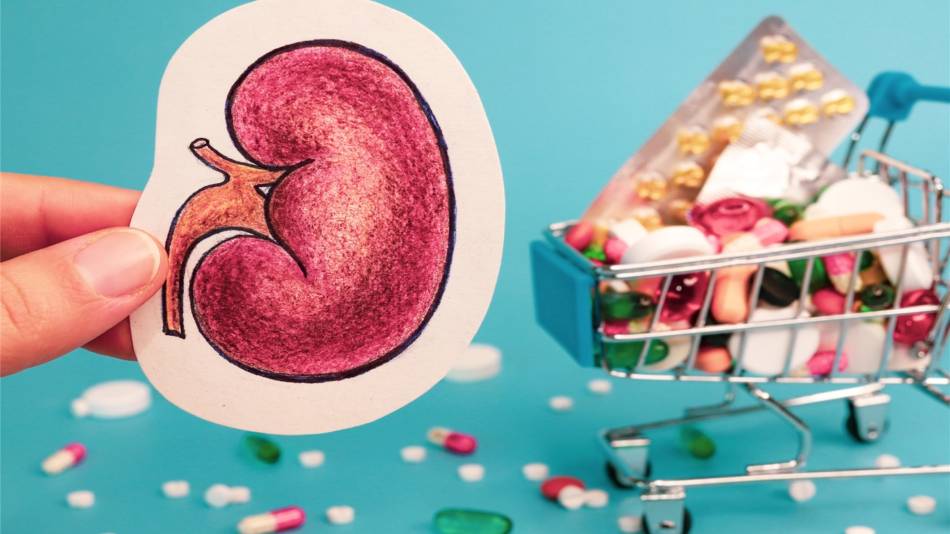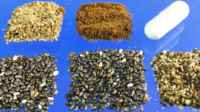
Answer:
Calcium oxalate stones, the most common type of kidney stone, form when calcium and oxalate (or oxalic acid, which is naturally present in many plant-based and is also produced by the body as a waste product) bind together, forming crystals that can accumulate into a hard "stone."
Having excessive calcium in the urine (hypercalciuria) is the most common cause of calcium oxalate kidney stones. Calcium naturally in foods does not cause this (and can actually help), but people prone to calcium oxalate kidney stones are advised to avoid high-dose calcium supplements and to stay well-hydrated (as inadequate fluid intake can increase the risk of kidney stones). Those with high urinary oxalate levels may also be advised to maintain a low-oxalate diet, which typically limits intake to about 50 to 100 mg of oxalate per day.
Interestingly, too little citrate in the urine (hypocitraturia) is also a risk factor for developing calcium oxalate kidney stones. This can occur due to gastrointestinal conditions such as chronic diarrhea, colitis and irritable bowel syndrome, use of ACE inhibitor drugs such as benazepril (Lotensin), captopril (Capoten), and lisinopril (Zestril), and low-alkali diets (those low in fresh leafy greens, vegetables, citrus fruits and legumes) (Leslie, StatPearls 2022; Zuckerman, Rev Urol 2009).
As discussed below, there are supplements, foods, and beverages that may help reduce the risk of kidney stones (by interfering with the binding of calcium and other compounds that can form stones), as well as those that may increase the risk of kidney stone formation. Be aware that some of the supplements marketed for kidney stones have little or no evidence to support such use.
Use the links below for more details about each.
Supplements and beverages that may reduce the risk of kidney stones
There is evidence that some supplements and beverages may help reduce the risk of calcium oxalate kidney stones, but consult your physician before trying these approaches.
Potassium
Several forms of potassium found in potassium supplements may help reduce the occurrence of kidney stones, or, possibly, help to dissolve kidney stones, although more research is needed to confirm this. Interestingly, it is not potassium itself that makes these treatments work but the citrate, bicarbonate and phosphate portions of the potassium salts. Citrate and bicarbonate, for example, bind to calcium to form soluble calcium complexes in urine, preventing the growth and build-up of calcium crystals, and help to alkalize urine (make it less acidic), which may increase the clearance and dissolution of stone fragments (Caudarella, Arch Ital Urol Androl 2009). Potassium citrate is most commonly recommended to help alkalize urine, often at dose providing 30 to 60 milliequivalents (mEq) per day taken in divided doses (Pak, Metabolic Bone Disease and Clinically Related Disorders 1998).
There is good evidence that potassium citrate can inhibit kidney stone formation in a large percentage of people with recurrent kidney stones. For example, a clinical study found that patients who took 6,480 mg (or 60 mEq) of potassium citrate daily (divided into three equal doses, each taken after a meal) had no stone recurrence after one year, compared to a 28.5% stone recurrence rate in patients who did not take potassium citrate (Soygur, J Endourol 2002). Other citrate compounds may also be helpful, such as magnesium citrate and sodium citrate. Some supplements marketed to help prevent kidney stones provide potassium citrate at dosages similar to those found in prescription potassium citrate products, such as Urocit-K, which is often prescribed at a dose of 15 mEq twice daily for mild to moderate hypocitraturia, or 30 mEq twice daily for severe hypocitraturia (Note: Urocit-K comes in several other strengths, such as 10 mEq). Supplements that can provide comparable amounts of alkali citrate include Moonstone Stone Stopper sold as a powder in packets providing 30 mEq alkali citrate (from magnesium citrate, sodium citrate and potassium citrate) per packet. It costs $28.95 for a box of 15 packets. In a small clinical trial among 16 people with a history of kidney stones (calcium, uric acid, and cysteine stones) and mild to moderately low urine citrate levels, taking a packet of Moonstone powder mixed with water twice daily for one week significantly increased 24 hour urine citrate to near-normal (from 469 to 639 mg per day - 640 mg per day is normal) and 24 hour urine pH (from 6.21 to 6.61) compared to drinking water alone (Nazzal, J Urol 2021).
An analysis of products on the market showed that Thorne potassium citrate capsules, which are labeled to contain 99 mg of potassium per capsule, provide 4.2 mEq of alkali citrate per capsule. Similarly, NOW potassium citrate (99 mg of potassium per capsule) provided 4.3 mEq of alkali citrate per capsule. The same study tested Urocit-K 10 mEq tablets and found each to actually provide 12.4 mEq of alkali citrate. So, to get a dose equivalent to one Urocit-K 10 mEq tablet, one would need to take 3 times as many capsules of Thorne or Now. The study found that NOW (7 cents per capsule), however, was only a fraction the cost of Urocit-K ($1 per tablet) as well as Thorne (14 cents per capsule) (Wong, Urol Prac 2022). Similarly, one would have to take 16 to 24 tablets of Horbaach potassium citrate to achieve similar clinically prescribed doses of potassium citrate (Dai, J Endourol 2022).
Be aware that supplements containing potassium citrate and other forms of citrate should be taken with food in order to avoid potential side effects such as stomach irritation, nausea and diarrhea. People with kidney disease or other conditions that impair potassium excretion, and people taking potassium-sparing diuretics (often prescribed to lower blood pressure) should not take potassium without consulting their physician.
Potassium phosphate may help people with kidney stone disease because the phosphate decreases excessive calcium in the urine in people with hypercalciuria. A small clinical study found that 2,496 mg of potassium (as potassium phosphate) taken as four tablets twice daily for four years reduced urinary calcium by 30% to 35% in patients with absorptive hypercalciuria (Heller, J Urol 1998).
Several case reports suggest that potassium bicarbonate may help dissolve kidney stones and prevent recurrence, although this does not seem to have been tested in clinical trials.
Magnesium
There is preliminary evidence that taking a magnesium supplement (as magnesium oxide) with meals may reduce urinary oxalate levels, but more research is needed to determine if regular magnesium supplementation reduces the risk of kidney stones.
Lemon juice, orange juice and other sources of citrate
Certain juices and beverages can also be good sources of citrate and potentially decrease the risk of kidney stones, including lemon juice, orange juice, and Crystal Light. Another benefit of drinking your citrate (as opposed to taking pills), is that it increases your fluid consumption, which is an important component of any kidney stone treatment regimen.
Although grapefruit juice is also a good source of citrate, be aware that it can interact with many medications, including benzodiazepines (Valium, Xanax), certain statin drugs (Lipitor, Zocor) and others.
Hydroxycitric acid (HCA), a component of Garcinia cambogia extract, is chemically similar to citrate. While laboratory studies have suggested that HCA may help prevent or treat a common type of kidney stones, clinical evidence to-date does not support this use.
Tea
People who are prone to kidney stones are sometimes advised to avoid tea because it contains oxalate (a substance that can bind with calcium to form calcium oxalate kidney stones — the most common type of kidney stone) (Massey, J Am Diet Assoc 1993). However, this does not appear to be a concern with green tea because green tea contains a much lower amount of oxalate (1.36 mg per cup) than black tea (9.54 mg), as does oolong tea (0.58 mg) and herbal tea (0.84 mg) according to one study (Charrier, Asia Pacific J Clin Nutr 2002). Iced tea prepared by cooling brewed tea contains a similar oxalate amount as brewed tea (Oxalosis & Hyperoxaluria Foundation, Accessed 5/1/25). Ready-to-drink iced teas may contain slightly less oxalate than brewed green tea (0.3 to 2.0 mg vs 0.8 to 14.0 mg of oxalate per 3.4 fl. oz) (Siener, Nutrients 2021), but overall intake of oxalate from ready-to-drink iced tea may be similar to that of brewed green tea due to larger typical serving sizes (12 fl. oz) of iced tea.
Adding milk to black tea may reduce the amount of oxalate that is absorbed. In fact, some experts have concluded that, overall, consuming either green tea or black tea with milk may be helpful for people with a history of kidney stones (Charrier, Asia Pacific J Clin Nutr 2002). In addition, keeping steeping time to no more than 3 to 5 minutes and avoiding vigorous stirring may also reduce the amount of oxalate coming from brewed black tea (McKay, J Am Diet Assoc 1995; Mahdavi, Urolithiasis 2013). One study found that steeping black tea in hot water for 10 to 60 seconds, removing, and then steeping in a fresh cup of hot water for the regular amount of time appears to reduce the amount of oxalate by 10% to 65% without impacting the taste, smell or appearance of the tea (Clement, Nephrol Ther 2025). Furthermore, there is some evidence that green tea may actually inhibit the formation of oxalate crystals: In animal studies, green tea, and in particular, EGCG from green tea, has been shown to reduce kidney stone formation (Chen, CrystEngComm 2010; Itoh, J Urol 2005; Jeong, J Endourol 2006). Interestingly, observational studies have reported a decreased risk of kidney stone formation of 8% and 14%, respectively, in women and men without a history of kidney stones who drink 2 to 3 cups of tea (the type of tea, i.e., black or green, and use of milk in tea not reported) per day (Curhan, Ann Intern Med 1998; Curhan, Am J Epidemiol 1996). However, as these are only associations and more research is needed, it would be best to consult with your healthcare provider before regularly consuming green tea if you have a history of kidney stones or have been advised to follow a low-oxalate diet.
Coffee
Although coffee contains oxalate, which can contribute to kidney stone formation, regular intake of coffee has been linked with a lower risk of kidney stones — although this does not prove a cause-and-effect relationship. Analysis of data from three observational studies that included nearly 300,000 people showed that those who consumed at least one serving of caffeinated coffee daily had a 26% lower risk of kidney stones compared to those who consumed less than one serving weekly. Caffeine in coffee can increase urine flow, which may be responsible for this inverse association. Interestingly, regular intake of decaffeinated coffee was also linked with a 16% lower risk of kidney stones, suggesting that other constituents in coffee such as chlorogenic acids may also help reduce kidney stones (Ferraro, Clin J Am Soc Nephrol 2013). Coffee also contains citrate (Engelhardt, Z Lebensm Unters Forsch 1985), and, as discussed above, citrate-containing beverages may help reduce the risk of kidney stones.
There is some concern that adding milk to coffee might increase the risk of kidney stones due to the calcium in milk, but this seems unlikely. Although higher intake of calcium from supplements has been linked with an increased risk of kidney stones, higher intake of calcium from the diet — including from dairy products — has been linked with a lower risk (see below for details). Furthermore, several studies have shown that consuming milk with oxalate-containing foods or beverages reduces the bioavailability of oxalate (Brogren, Asia Pac J Clin Nutr 2003; Savage, Eur J Clin Nutr 2003; Massey, J Am Diet Assoc 1998).
Chanca piedra
Chanca piedra (Phyllanthus niruri), also known as "stone breaker," is an herb that has been used traditionally to treat kidney stones, but there is no convincing clinical evidence that it works for this purpose.
One study among 56 people (average age 44) with small kidney stones showed that drinking 250 mL (about 8.5 fl oz.) of tea infused with 4.5 grams of chanca piedra twice daily for 12 weeks reduced the average total number of stones per participant from 3.2 at baseline to 2.0 after treatment, with about 68% of the participants showing a decrease in number of kidney stones (Pucci, Int Braz J Urol 2018). However, most people with kidney stones pass the stones spontaneously, so it is unclear if the reduction in kidney stones in this study was due to chanca piedra or natural progression of the condition, particularly as there was no placebo control — which also made it impossible to know if the high incidence of abdominal pain (in 66% of participants) was due to chanca piedra or the underlying disease.
Another study among people with kidney stones, all of whom received extracorporeal shock wave lithotripsy (which uses shock waves applied to the outside of the body to break up kidney stones into smaller pieces) and about half of whom received 2 grams of chanca piedra extract daily for 3 months after lithotripsy, showed no difference in the rate of kidney stone clearance between those who received chanca piedra and those who did not (Micali, J Urol 2006).
There is insufficient evidence as to whether vitamin B-6, fish oil/omega-3 supplements, or probiotic supplements reduce urinary oxalate levels (Pearl, AUA Guideline J Urol 2014).
Supplements that may increase the risk of kidney stones
Calcium
Increased risk of kidney stones in women has been observed with calcium from supplements (keep in mind, that calcium-fortified foods count as supplemental calcium). On the other hand, getting too little calcium from the diet has also been linked with increased risk of kidney stones. Data from observational studies found that higher dietary intake of calcium (about 800 to 940 mg of calcium per day) from dairy sources (including milk, yogurt, cheese) was associated with a 17% to 24% lower risk of kidney stones in men and women compared to lower dietary intake of calcium from dairy (about 140 to 180 mg daily) (Taylor, J Urol 2013). Experts recommend that people at risk of kidney stones try to get 1,000 to 1,200 mg of calcium daily naturally from their diet. If this amount of calcium cannot be achieved, a low dose of calcium (200 to 400 mg daily) from supplements in the form of calcium citrate is recommended (Finkielstein, CMAJ 2006). If taking calcium supplements, it may be best to take them with meals, as this may help to bind oxalate from the meal (Pearl, AUA Guideline J Urol 2014).
Choline
Choline supplementation has not been associated with an increased risk of calcium oxalate kidney stones. However, taking large doses of a particular form of choline, choline bitartrate, may lead to an unusual type of kidney stone made of crystals of calcium tartrate tetrahydrate. This type of kidney stone was reported in three men, each of whom consumed several servings daily for a year or more of the "vitamin and amino acid" energy supplement Spark (from Advocare), which contains a large amount of choline (as bitartrate or citrate).
Collagen
Collagen contains the amino acid hydroxyproline, which is converted in the body to glyoxylate, a precursor of the compound oxalate, which, at high levels, can increase the risk of kidney stones. A study among healthy individuals showed that consuming large amounts of collagen increased the oxalate levels in the urine, but consuming smaller amounts of hydroxyproline-rich protein did not. Based on this preliminary evidence, it may be wise for people with a history of kidney stones to avoid consuming large amounts of collagen.
Turmeric and curcumin
Turmeric supplements and spices can contain a substantial amount of oxalate, which might increase the risk of kidney stones. On the other hand, some curcumin products, which are extracts of turmeric, contain little to no oxalate.
Vitamin C
Vitamin C may increase oxalate absorption from foods, and ascorbate (from vitamin C) can be converted to oxalate, and therefore promote the formation of calcium oxalate crystals. Taking high doses of vitamin C (1,000 mg or more daily from supplements) has been associated with an increased risk of kidney stones among men and people with a history of kidney stones. The AUA advises that people with a history of calcium oxalate kidney stones avoid vitamin C supplements, noting that supplements generally provide much higher doses than is obtained through diet alone (Pearl, AUA Guideline J Urol 2014).
Foods and beverages that may increase the risk of kidney stones
It is recommended that people with calcium oxalate stones and relatively high urinary oxalate limit intake of oxalate-rich foods along with normal calcium consumption. People with malabsorptive conditions (such as irritable bowel disease (IBD) or those who have had Roux-en-Y gastric bypass surgery) and high urinary oxalate levels may benefit from more restrictive oxalate diets, as well as from higher calcium intakes (Pearl, AUA Guideline J Urol 2014).
For people who are advised by their physician to follow a low-oxalate diet, this often means aiming to restrict intake to no more than about 50 mg to 100 mg of oxalate per day. As shown in the table below, even a single serving of some high-oxalate foods can exceed this amount.
Be aware that not all people with a history of calcium oxalate kidney stones have high urinary levels of oxalate, and intake of oxalates from foods is only one of a number of factors that may influence urinary oxalate levels, which also include body mass index, fructose intake, and, as discussed earlier, getting adequate, but not excessive dietary calcium (Taylor, Clin J Am Soc Nephrol 2008). In fact, the American Urological Association cautions that overly restrictive low-oxalate diets should be avoided as some foods "high" in oxalate, such as whole grains and vegetables, have health benefits.
Unless otherwise noted, information below is from the Harvard T.H. Chan School of Public Health Oxalate Database, which includes oxalate levels for many additional foods.
Foods with Highest Amounts of Oxalate |
||
|
|
||
| Food | Serving Size | Oxalates (mg) |
| Buckwheat Groats (Roasted, Cooked) | 1 cup | 132.6 |
| Wheat Berries (Cooked) | 1 cup | 97.6 |
| Bulgur (Cooked) | 1 cup | 85.9 |
| Quinoa (Cooked) | 1 cup | 54.4 |
| Raisin Bran | 1 cup | 46.1 |
| Whole Wheat Spaghetti | 1 cup | 46.1 |
| Corn Grits (Cooked with Water, No Salt) | 1 cup | 45.2 |
| Raisin Nut Bran | 1 cup | 44.8 |
| 40% Bran Flakes | 1 cup | 42.7 |
| Shredded Wheat | 1 1/3 cup | 41.8 |
| Uncle Sam Cereal | 3/4 cup | 41.7 |
|
|
||
| Spinach (Boiled, Unsalted) | 1/2 cup | 547.4 |
| Spinach (Raw) | 1/2 cup | 316.2 |
| Potato (Baked, Unsalted, Flesh & Skin) | 1 potato | 91.7 |
| Beets (Canned, Drained) | 1/2 cup | 76.4 |
| Potato (Microwaved, Unsalted, Flesh & Skin) | 1 potato | 68 |
| Beetroot Juice | 3.4 oz | 54 mg*** - 65 mg |
| Sweet Potato (Cooked, Baked, Unsalted, Flesh & Skin) | 1/2 cup | 54.2 |
|
|
||
| Dates | 5 dates | 25.5 |
| Oranges (Raw) | 1 orange | 23.2 |
|
|
||
| Almonds (Raw) | 1 oz | 107* |
| Navy Beans (Canned) | 1/2 cup | 96.3 |
| Almonds (Oil Roasted, Unsalted) | 1 oz | 72 |
| Cashews (Oil Roasted, Unsalted) | 1 oz | 63.5 |
| Refried Beans (Canned) | 1/2 cup | 59.6 |
| Baked Beans (Canned) | 1/2 cup | 57.5 |
| Mixed Nuts with Peanuts (Oil Roasted, Unsalted) | 1 oz | 45.2 |
| Almond Butter (Salted) | 1 tbsp | 41.6 |
|
|
||
| Cocoa Powder | 1 tbsp (6 grams) | 43.74** |
| Dark Chocolate Bar | 1.7 oz (50 grams) | 76.5 mg** - 100 mg |
|
|
||
| Miso Soup | 1 cup | 58.3 |
| Plant-Based Burger (Brand not listed) | 1 patty | 57.9 |
| French Fries (Fast Food) | 6 oz | 48.6 |
| Meat Lasagna | 1 piece/cup | 45.7 |
| French Fries, Sweet Potato | 6 oz | 37.1 |
**Schroder, J Food Compost Anal 2011
***Sierer, J Food Compost Anal 2016
Almonds
Almonds are high in oxalates, containing approximately 72 mg (roasted) to 107 mg (raw) per 1-oz. serving. Consuming a large amount of almonds on a daily basis could exceed the recommended daily limit for a low-oxalate diet.
Almond milk & other plant-based milks
Almond milk and certain other plant-based milks can contain high concentrations of oxalates. Researchers who analyzed the oxalate concentration of various plant-based milks found that almond milk contained the highest concentrations, followed by cashew, hazelnut, and soy, while macadamia, oat, and rice contained the lowest concentrations. When also taking into consideration the labeled amounts of sodium, calcium and potassium in various plant-based milks, the researchers have advised that oat, macadamia, rice, and soy milk may be the best choices of plant-based milk for people with kidney stones, with a similar risk profile as regular dairy milk.
Beets and beetroot juice
As noted in the table above, beets and beetroot juice can contain high levels of oxalates.
Chia Seeds
Chia seeds are high in oxalates, containing approximately 254 mg of oxalates per 100 grams (about ½ cup). If consumed in excess, or combined with other foods high in oxalates, consuming chia seeds could increase the risk of certain types of calcium oxalate and uric acid stones in some people.
Cocoa and dark chocolate
Cocoa and chocolate are high in oxalates. Although cocoa powders tend to contain higher concentrations of oxalates than chocolate bars, a single, typical serving of either cocoa or chocolate can contain higher amounts of oxalates than people who are following a low-oxalate diet should consume in a day, as shown in the table above.
Cranberry Juice and supplements
Cranberry juice contains moderate amounts of oxalate (as may some cranberry supplements), although there is conflicting evidence regarding the effects of cranberry on the risk of kidney stones. For example, some studies have reported a decrease in urinary oxalate levels with regular consumption of cranberry juice, while a small study found supplementation with cranberry tablets increased urinary oxalate levels by 45%, and this increase was even greater when the supplement was taken with vitamin C (a common added ingredient in cranberry supplements). To be safe, people with a history of kidney stones should consult with their physician before regularly consuming cranberry juice or taking cranberry supplements.
Plant-based "meats"
Some plant-based meats might increase the risk of kidney stones compared to animal-based proteins due to their higher oxalate content. A study that compared the nutrient content of 47 plant-based meat products resembling beef, pork, chicken, or seafood with that of corresponding animal protein products found that soy-based beef contained, on average, 18 mg of oxalate per serving, while soy-based chicken, pork and seafood, respectively, contained an average of 11 mg, 10 mg and 7.4 mg of oxalate per serving. In contrast, plant-based meats that used pea protein contained only trace amounts of oxalate, similar to actual animal-based meats. Although the researchers noted that a small amount of plant-based meats used wheat, corn, rice and various bean proteins, the amount of oxalate in these plant-based protein sources was not reported (Liaw, J Endourol 2022). Be aware that the Impossible Burger is made primarily with soy protein, while the Beyond Burger is made with pea protein. (See our comparison of these burgers.)
Not proven to help
Alkaline water
Alkaline water is generally not a good option for meeting alkali intake recommendations for people with a history of these types of kidney stones, as it may not alkalize urine. In fact, an analysis of five brands of alkaline waters sold in the U.S. (Essentia, Smart Water Alkaline, Great Value Hydrate Alkaline Water, Body Armor SportWater, and Perfect Hydration) by researchers at the University of California found that although all the waters had an alkaline pH (ranging from 9.85 to 10.15), the physiologic alkali content (i.e., organic anions that can be metabolized to alkali) of each was less than 1 mEq, meaning they would not contribute to the typically recommended alkali dose of 30 to 60 mEq per day to reduce kidney stone risk (as discussed above). The alkaline waters contained a combination of ingredients such as sodium, sodium bicarbonate, potassium (as dipotassium phosphate, potassium carbonate, or potassium bicarbonate), magnesium (as magnesium sulfate or magnesium chloride) and calcium chloride (Schiano, Food Chem 2024).
Apple cider vinegar
Apple cider vinegar is sometimes promoted to reduce the risk of kidney stones due to its acetic acid content, and there is some preliminary evidence that consuming vinegar may alter urinary citrate and calcium excretion (which could help prevent urinary calcium oxalate crystal formation). However, there are no clinical studies to supporting such a benefit, and some researchers have noted that that it would be difficult to consume enough apple cider vinegar to make it a better option than other supplements and beverages (Joshi, Urology 2021). [Note: Consuming too much vinegar can also have adverse effects.]
Coconut water
Although preliminary research has suggested a possible role for coconut water in preventing kidney stone formation, and some websites claim it can "dissolve" kidney stones, none of this has been proven in people. A study in healthy adults without a history of kidney stones found that, compared to tap water, coconut water increased citrate in the urine by an average of 29% (161 mg per day) and, not surprisingly, potassium increased by even more -- by 130%, but did not affect urinary pH. In addition, this approach could be dangerous for people who need to restrict their potassium intake, and there are more efficient ways to increase urinary citrate.
Many supplements are promoted to prevent or treat kidney stones despite having little or no evidence to support their use. A review of supplement labels for 27 products sold online through Amazon and/or Google that make claims to prevent, cure, dissolve or treat kidney stones (and ranging in cost from $4 to $189 for a 30-day supply) showed that nearly two-thirds (18 products) contained ingredients with conflicting or absent evidence of benefit (Koo, J Endourol 2020). The study did not provide product names, but some of the ingredients found in these products included apple cider (as discussed above), burdock seed, juniper berry, celery seed, cinnamon bark, dandelion root, hydrangea, ginger root, gravel root, lemon balm leaf, licorice root, marshmallow root, parsley root, shilajit, and turmeric (which, as noted above, could potentially increase risk of kidney stone formation).
Join today to unlock all member benefits including full access to all CL Answers and over 1,400 reviews.
Join NowAlready a member? Sign In Here.
Join now at www.consumerlab.com/join/





















Submit your comment
This feature is restricted to active members.
Join now to add comments and get all member benefits, including over 1,400 reviews.
Join NowAlready a member? Sign in here.